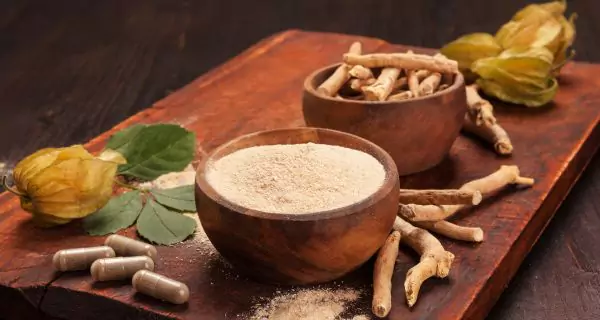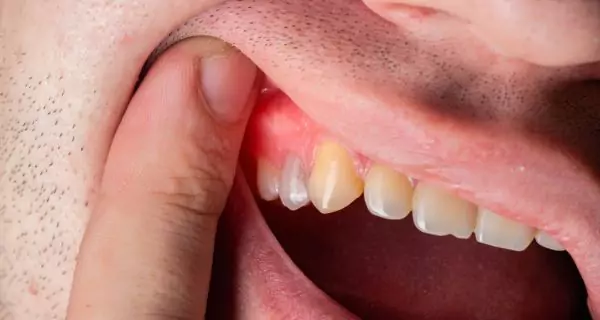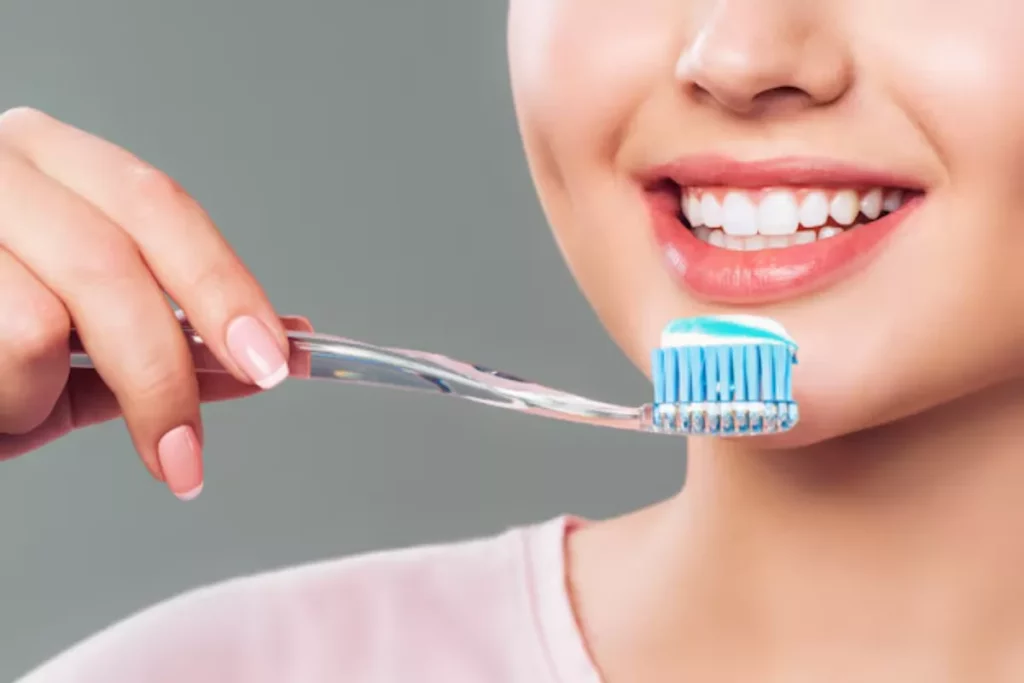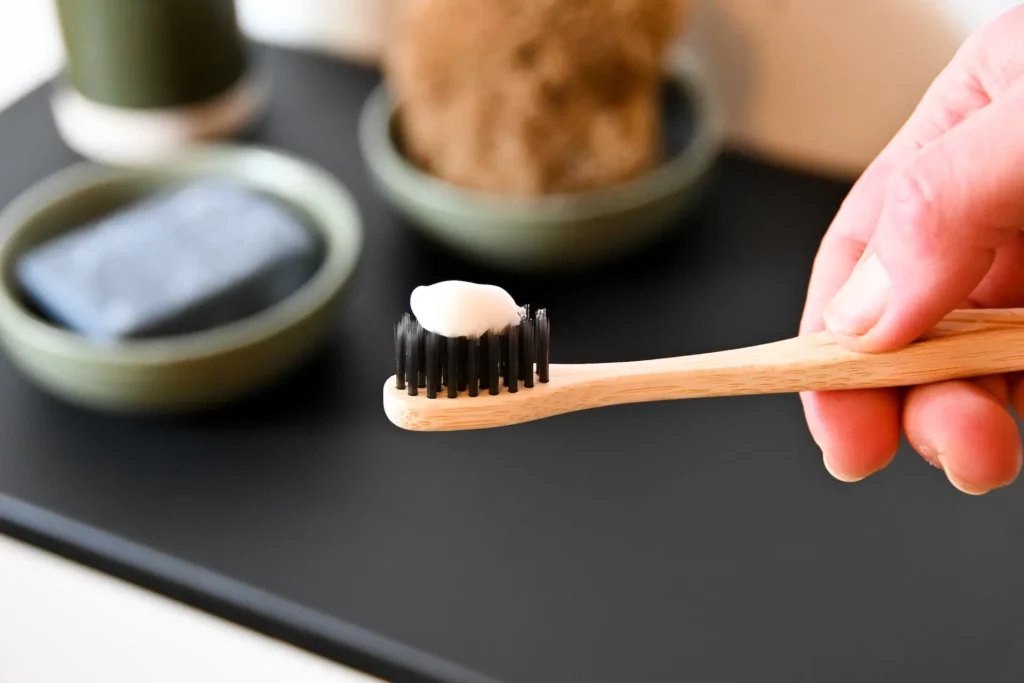Last Updated on: 19th September 2025, 12:29 pm
Ashwagandha benefits oral health by reducing inflammation, supporting gum healing, lowering stress-related teeth grinding, and boosting the immune system. It is a natural herb that can be taken in capsules, powder, teas, or even some herbal oral care products. However, it should never replace brushing, flossing, or dental visits.
Herbal supplements have become very popular for improving overall health. One of the most studied herbs is ashwagandha, known for its ability to reduce stress, increase energy, and support the immune system.
But what about your teeth and mouth? While ashwagandha is mostly used for general wellness, it may have an indirect effect on oral health.
In this article, we will explore the ashwagandha benefits for the mouth and teeth and explain how to use the herb safely.
What is ashwagandha and how does it work?
Ashwagandha (Withania somnifera) is an ancient herb, which has been used in Ayurvedic medicine for over 3,000 years. It is sometimes called Indian ginseng because it can help boost energy and reduce stress.
Ashwagandha is an adaptogen: it helps your body handle physical and mental stress. Its active compounds, called withanolides, provide:
- Anti-inflammatory effects: to reduce swelling and redness in tissues.
- Antioxidant protection: to fight harmful molecules in the body.
- Immune system support: to help your body fight infections better.
Traditionally, people use ashwagandha for:
- increase energy and vitality
- reduce stress and anxiety
- improve sleep
- support memory and focus
Modern research is now studying how ashwagandha may also help oral health, mainly because it supports inflammation control, immunity, and tissue repair throughout the entire body.
How can ashwagandha benefit your body?
Even in small doses, ashwagandha can support general wellnes in several ways:
- Reduces stress and anxiety: lowers cortisol levels and improves mood.
- Improves sleep: helps you fall asleep faster and get better sleep quality.
- Supports exercise and muscle health: reduces fatigue, increases strength, and may improve cardiovascular fitness.
- Supports fertility and hormones: can increase testosterone, sperm quality, and reproductive health.
- Improves cognitive function: helps memory, attention, and focus.
- Helps control blood sugar: can reduce glucose, insulin, and oxidative stress markers.
- Reduces inflammation: may ease symptoms of arthritis and other inflammatory conditions.
These body-wide effects create a healthier system that also supports oral health.
Which body conditions influenced by ashwagandha affect oral health?
Ashwagandha supports several body conditions with a direct impact on oral health. By improving overall wellness, it indirectly protects your teeth, gums, and oral tissues.
Chronic stress and anxiety
Stress affects the mouth in many ways. Ashwagandha helps by lowering cortisol and relaxing the body. Benefits include:
- reducing dry mouth, which lowers cavity risk
- preventing teeth grinding (bruxism) and enamel wear
- decreasing jaw tension and gum irritation
- supporting overall oral comfort
Insomnia and poor sleep
Poor sleep weakens immunity and slows healing, which can affect oral health. Ashwagandha improves sleep and helps:
- boost the immune system to fight oral infections
- promote faster gum and tissue healing
- reduce inflammation in the mouth
- support overall oral health through restorative sleep
Diabetes and blood sugar control
High blood sugar can harm the gums and increase periodontal disease risk. Ashwagandha helps regulate blood sugar and:
- reduces glucose spikes that damage gum tissue
- lowers inflammation that worsens periodontal problems
- supports overall tissue repair and gum health
- helps prevent complications related to oral infections
High blood pressure and heart disease
Cardiovascular problems can reduce blood flow and increase inflammation in the mouth. Ashwagandha’s benefits include:
- reducing inflammation in gums and oral tissues
- improving circulation to support healthy gums
- protecting against gum disease linked to heart conditions
- supporting overall oral tissue regeneration
By supporting these conditions, like stress, sleep, diabetes, and cardiovascular health, ashwagandha strengthens oral health.
How can ashwagandha benefit your oral health?
Even though ashwagandha is not a toothpaste, its natural properties support oral health indirectly in several ways.
Can ashwagandha reduce gum inflammation?
Yes, ashwagandha has anti-inflammatory and antioxidant compounds that:
- reduce gum redness, swelling, and bleeding
- improve blood flow in the gum tissue
- help repair tissue after dental procedures
In short, it is helpful for gum diseases such as gingivitis and periodontitis. Chronic inflammation is a key factor in these conditions, and ashwagandha’s effects complement traditional periodontal treatments.
Note: It should never replace regular dental hygiene or prescribed medications.
Can it protect against oral bacteria?
Preliminary studies show that ashwagandha may have antimicrobial properties, which can:
- limit the growth of harmful oral bacteria
- support remineralization of teeth
Note: It does not replace fluoride toothpaste or mouthwash.
How does ashwagandha strengthen the immune system in the mouth?
Ashwagandha’s immunomodulatory effects help the body:
- fight oral infections like abscesses
- reduce the risk of severe gum disease
- speed up healing after dental treatments
Can ashwagandha help with stress and teeth grinding (bruxism)?
Stress can cause bruxism, which damages teeth and gums. Ashwagandha helps by:
- lowering stress hormone levels (cortisol)
- reducing jaw tension and pressure on teeth and gums
- protecting teeth from damage
- supporting overall oral comfort
Does it support healing after dental treatments?
Yes, thanks to antioxidants and anti-inflammatory effects, ashwagandha may:
- promote soft tissue regeneration in the mouth
- support recovery after extractions, cleanings, or periodontal procedures
Ashwagandha can help keep your gums and teeth healthier by reducing inflammation, fighting bacteria, and supporting healing. It helps protect against damage from stress and teeth grinding. To get the best results, it’s important to use it safely and follow proper guidance.
Is ashwagandha safe for everyone?
Ashwagandha is generally safe for most healthy adults when used correctly. However, not everyone should take it. Certain precautions are needed.
- Children: should only take ashwagandha under medical supervision. Dosage and safety are not well studied in kids.
- Seniors: may benefit from ashwagandha, especially for stress, sleep, and inflammation. But they should:
- monitor interactions with medications like sedatives, blood pressure drugs, or diabetes medications
- start with low doses and adjust under medical guidance
- Pregnant or breastfeeding women: should avoid ashwagandha unless approved by a doctor. High doses may cause miscarriage or affect milk production.
Who should avoid ashwagandha?
Ashwagandha may be unsafe for people with:
- Autoimmune diseases: It may worsen symptoms
- Hyperthyroidism: It may increase thyroid hormone levels (T3, T4)
- Liver disease: It may cause liver damage
- Hormone-sensitive cancers (prostate, breast): It may affect hormone levels
- Upcoming surgery: may slow the central nervous system, interacting with anesthesia
It may also interact with medications such as:
- Antidiabetes drugs: It may lower blood sugar too much
- Blood pressure medications: It may lower blood pressure too much
- Immunosuppressants: It may reduce effectiveness
- Sedatives: may increase drowsiness or slow breathing
- Thyroid hormone medications: It may increase thyroid levels
If you are a healthy adult, ashwagandha should be safe for you. But certain groups, such as children, pregnant women, or people with specific health conditions, should avoid it or use it only under medical guidance.
Since risks depend on dosage and personal health, it is important to know the possible side effects before starting.
What are the side effects of ashwagandha?
Ashwagandha is safe for most people, but it can sometimes cause unwanted effects. They depend on the dose, how long you take it, and your health condition.
What are the common side effects?
Some mild effects may appear, especially at higher doses:
- drowsiness or feeling very tired
- stomach upset, diarrhea, nausea, or vomiting
- headache or dizziness
- dry mouth in some cases
When are side effects more likely?
The risk increases if you:
- take more than the recommended dose
- use it for longer than three months without guidance
- combine it with thyroid, blood pressure, diabetes, or sedative medications
- already have liver or autoimmune problems
How can you reduce your risk?
- Start with a small dose and increase slowly if needed.
- Take it with food to avoid stomach upset.
- Avoid alcohol or sedatives while using it.
- Always follow medical advice and product instructions.
Ashwagandha is safe for most people, but it may cause tiredness, stomach issues, or headaches. In rare cases, it can affect the liver. Use carefully, and stop if unusual symptoms appear.
What are the safe ways to take ashwagandha?
Ashwagandha is flexible and easy to use. You can find it in different forms, so you can choose what fits best with your lifestyle and health goals.
What are the most common forms?
- Capsules or tablets: simple and ready to take, with clear doses
- Powder: mix into smoothies, yogurt, or even warm milk
- Liquid extract (tincture): quick to absorb and easy to measure
- Tea or infusion: a gentle option to relax
- Oral care products: some ayurvedic toothpastes or mouthwashes add ashwagandha with herbs like neem or myrrh
How much should you take?
- Root extract: 300–500 mg, once or twice daily
- Powder: 1–2 grams, 2–3 times daily
- Tea or infusion: 3–5 grams per day
Most people notice benefits after 4–12 weeks. Do not use it for more than three months without checking with a doctor.
When is the best time to take it?
- If you want to manage stress or anxiety, split your dose during the day.
- If you want to sleep better, take it closer to bedtime.
- It can be taken with or without food.
If you want to enjoy all the ashwagandha benefits, be consistent, and always ask a health professional before starting any new supplement.
What products are worth trying?
Since ashwagandha is a supplement and not FDA-regulated, product quality can vary by brand. It’s best to pick trusted brands that are tested and free from fillers.
Some popular options are:
Are there oral care options?
Yes, although they are not very common. Some ayurvedic brands make:
- herbal toothpastes with ashwagandha, neem, or myrrh
- natural mouthwashes that include ashwagandha with other plants
Ashwangandha comes in different presentations. Choose the form that feels right for you, start with small doses, and always buy good-quality products.
Is ashwagandha a good support for oral care?
Yes, ashwagandha cannot replace brushing, toothpaste, or dentist visits, but it can support oral health in natural ways. Ashwagandha benefits include helping reduce gum inflammation, fighting harmful bacteria, lowering stress and bruxism, supporting healing, and improving immunity.
Used alongside good oral care and healthy habits, ashwagandha can be a helpful natural ally for keeping your mouth healthy.
Frequently Asked Questions
Can I take ashwagandha with other herbal supplements?
Can I use ashwagandha in toothpaste or mouthwash?
Is ashwagandha safe for long-term use?
Can it prevent tooth loss?
Can ashwagandha help with bad breath?
Voice and Search (Q&A)
Can I take ashwagandha if I have sensitive gums?
Usually yes. Ashwagandha may help gum health, but check with a doctor if you have health conditions.
Can ashwagandha replace brushing my teeth?
No, ashwagandha supports oral health but should not replace brushing, flossing, or dental visits.
How long until ashwagandha helps my oral health?
Benefits may appear after 4–12 weeks of consistent use.
Share
References
1. Cleveland Clinic. (2025, July 31). Does ashwagandha work? Cleveland Clinic. https://health.clevelandclinic.org/what-is-ashwagandha
2. Elgar K. (2021) Ashwagandha: A Review of Clinical Use and Efficacy. Nutr Med J., 1 (1): 68-78. https://www.nmi.health/ashwagandha-a-review-of-clinical-use-and-efficacy/
3. Hall, J. (2025, June 13). Top 7 benefits of ashwagandha, backed by science. Health. https://www.health.com/ashwagandha-7198123
4. Kubala, J., Spritzler, F. (2023, November 7). Health benefits of ashwagandha, based on research. Healthline. http://healthline.com/nutrition/ashwagandha
5. Mardomo, C. (2025, February 4). 10 ashwagandha benefits for Women. Verywell Health. https://www.verywellhealth.com/ashwagandha-benefits-for-women-8776598
-
Dr. Yeidy Carolina Mesa [Author]
DDS Yeidy Carolina Mesa Passionate Dentist | Advocate for Accessible Oral Health Education Graduating from Universidad CES in 2022, I am a dedicated general dentist with a lifelong passion for helping others and making a meaningful impact in the world. My journey into dentistry began at the age of 7, inspired by my own experience with braces and overcoming a fear of the dentist. This personal journey shaped my mission to help patients conquer their own dental anxieties and embrace a healthier,...
View all postsRecent Posts
-
Nayibe Cubillos M. [Medical Reviewer]
Pharmaceutical Chemestry |Pharmaceutical Process Management | Pharmaceutical Care | Pharmaceutical Services Audit | Pharmaceutical Services Process Consulting | Content Project Manager | SEO Knowledge | Content Writer | Leadership | Scrum Master
View all posts
A healthcare writer with a solid background in pharmaceutical chemistry and a thorough understanding of Colombian regulatory processes and comprehensive sector management, she has significant experience coordinating and leading multidisciplina...























